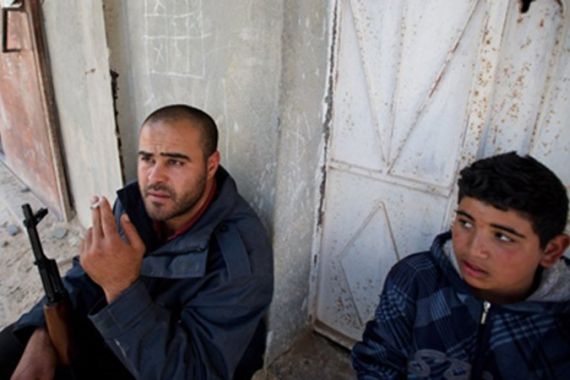Libya warns against UK military advisers
Libyan official criticises British plan to send team to support pro-democracy opposition forces in Benghazi.

| The UK says it will add military advisers to its diplomatic team in the opposition stronghold of Benghazi [Al Jazeera] |
Libya’s deputy foreign minister has spoken out against a British plan to send a team of military officers to the North African country to advise the rebels.
Khaled Kaim said Britain’s attempt to help the opposition forces would be futile.
“This is not in the interest of the UK,” Kaim told The Associated Press news agency on Tuesday.
“This is an impossible mission. To organise who? They [the rebels] are different groups. There is no leader. They are not well-organised, and I am sure it will be a failure,” Kaim said.
 |
| Keep up with all the latest developments here |
His comments came after the British foreign minister, William Hague, announced that military advisers would join a group of British diplomats already co-operating with the Libyan National Transitional Council, based in the opposition stronghold of Benghazi.
“They will advise the National Transitional Council on how to improve their military organisational structures, communications and logistics, including how best to distribute humanitarian aid and deliver medical assistance,” he said.
However, the foreign office said the team would not train or arm forces fighting troops loyal to Muammar Gaddafi, the Libyan leader.
Hague insisted that the deployment would be “fully within the terms” of the United Nations Security Council resolution on Libya that authorised the set up of a no-fly zone over the country.
On Wednesday France also said it would be sending a small number of military liaison officers to work with opposition forces in a similar capacity.
“There will be a small number of liaison officers [placed] with the national transition council in order to organise the protection of the civilian population,” Francois Baroin, a government spokesman, said.
‘Taking sides’
Hague’s announcement sparked some criticism among supporters of British prime minister David Cameron’s coalition government.
Several lawmakers from Cameron’s Conservative Party called for the recall of parliament, now in recess, to debate the move. They argued that circumstances have changed since parliament approved British participation in the Libya no-fly zone last month.
Peter Bone, one Conservative lawmaker, voiced concern that Britain seemed to be “taking sides in a civil war”.
But Omar Ashour, director of Middle East studies at the Institute of Arab and Islamic Studies at the University of Exeter said the deployment of British advisers to Libya is a necessary step.
“[There are] training problems, logistical problems. Many of the forces in the [opposition] are merely civilians who have never taken up arms before. So there will need to be some training,” Ashour told Al Jazeera.
“It’s necessary right now especially because many Libyans – from Misurata and Benghazi – have been calling for direct boots on the ground.”
EU armed escorts
The European Union, meanwhile, said it is ready, in principle, to provide armed escorts to secure UN aid convoys in Libya, though UN officials said they do not need such guards for the time being.
The proposal drew a warning from Libya’s deputy foreign minister that sending armed escorts would be tantamount to a military operation.
The UN resolution bans the use of foreign troops in Libya.
Russia – a veto-wielding member of the Security Council – already has complained that the NATO action in bombing Libya’s military has overstepped its mandate, and therefore is unlikely to approve any further extension of the alliance’s operations.
“The UN Security Council never aimed to topple the Libyan regime,” Russian foreign minister Sergei Lavrov said in Belgrade on Tuesday. “All those who are currently using the UN resolution for that aim are violating the UN mandate.”
The NATO-led international operation to enforce the no-fly zone and protect civilians has been criticised by Libyan pro-democracy forces in recent weeks for failing to do enough to protect them from attack by pro-Gaddafi fighters.
Mustafa Abdul-Jalil, an opposition leader touring Europe in search of more logistical support, said the Libyan opposition is not looking to other nations to remove Gaddafi.
“We are not looking or inviting anybody to kill him, and we don’t have such a possibility, but we hope he and his regime can leave Libya as soon as possible,” Abdul-Jalil said in Italy.
Stalemate
The military struggle for control of Libya has ground to a stalemate, with pro-democracy fighters backed by air strikes apparently capable of holding their ground in the east of the country, while Gaddafi continues to control Tripoli and the west, apart from the city of Misurata.
But Gaddafi’s son, Saif al-Islam, told state television on Tuesday that he was confident the rebellion would fail.
“I am very optimistic and we will win,” Saif said on Allibya television. “The situation changes every day in our favour.”
Meanwhile Libya’s opposition leaders said that at least 10,000 people had died since the start of the conflict in February.
Mike Hanna, Al Jazeera’s correspondent in Benghazi, said: “Given the intensity of the conflict, it doesn’t come as a surprise.
“We have focused on areas like Misurata, where the humanitarian crisis is well documented; however it is happening throughout Libya, the full extent of the crisis is not known and there is no real idea of [casualty] figures.”